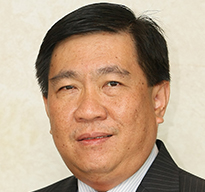Agenda
Tuesday, August 11
 Chen Kah Seong
Chen Kah Seong
Vice President,
Centre of Excellence Development and Production,
Upstream Business,
PETRONAS
The price of oil has risen and fallen spectacularly in past decades, yet the industry faces unprecedented uncertainty about the direction in which prices will move in the future. In recent years, analysts expected a continuous price rise, mostly due to oilput disruptions in major producing nations. Others envisaged lower prices on account of stagnant oil consumption caused by ongoing trade disputes and efforts to stabilize climate. More recently, the devastating effect of COVID-19 on oil demand, and the subsequent filling of worldwide oil storage capacity, have exacerbated the market disorder and sent prices plunging – even to negative levels. This introductory session will assess the current drivers of oil market supply and demand, and attempt to form a view of price prospects for the near future and beyond. Implications for investment, trade, well decommissioning, environment and policy will also be covered.
Discussion Leader:
- Oil Market Developments and Prospects, Roberto F. Aguilera, Curtin University Oil and Gas Innovation Centre
The Covid-19 Pandemic coupled with the price war between Saudi and Russia have set up a perfect storm to the global economy and resulted in an unprecedented collapse of the oil and gas demand and prices. The main oil benchmarks and key gas prices plummeted to catastrophic levels causing operators to shut down operations, companies to take massive cost cuts as well as threatening the viability of future sanctioned projects and exploration. This health crisis not only added additional intricacy into our daily lives and working arrangements, but it also affected companies portfolios and valuations as almost all are expected to review their books for impairments. This just added another category of risks that needs to be considered along with the conventional parameters that affect our decision making. Although it seems impossible to resolve the complexity, is there any practical method of which oil and gas companies can manage these risks and strategically choose the highest valued opportunities?
This session aims to address the following topics, and not limited to:
- Non-technical risks quantification and impact to investments, ie geopolitics and legislative risks
- Sharing of risks management philosophy in decision making and portfolio management
- Risk quantification models that can reasonably capture these risks in aiding investment decision
- Discussion on exploration in view of latest development and trend towards renewables
Discussion Leaders:
-
De-Risking, To Do or Not To Do?, M Shahmi M Shah and Megat Adlan Sufri Megat Majid, PETRONAS Carigali Sdn Bhd
-
Risk-Based Decision Model for Investment and Portfolio Evaluation in the Oil Industry, Jean Michelez, KWANTIS
Wednesday, August 12
The panel session will gather senior executives and industry experts to discuss the question in everyone’s mind; with the rapid movement and talks around renewable energy, how will the oil and gas industry be able to fit in this new age of energy transition?
As these challenges are faced throughout the value chain, the role of petroleum economics should play a more prominent role to support decisions our businesses are required to make in the future. The panel session will cover pertinent areas on this topic such as:
- Value Chain Planning – Where are we going between now and in the next 20 years, and how will these directions affect current assumptions?
- How does this impact the exploration, when renewables are being considered?
- Transition and energy mix – What are the challenges faced by oil and gas companies on cleaner energy, and will there be changes in business models we need to make?
- Are we in competition with renewable energy, or can we work together instead?
- The impact on project economics with the application of clean technology (i.e. CCUS, reducing methane flaring)
- Account for the impact of pandemic COVID-19 (and any future pandemic) result in collapse in the oil prices and any lessons to learn from.
We are in the midst of a very important revolution. Digitalisation has transformed many existing industries and not to mention creating completely new ones. From technology advances, such as the use of drones, to advanced workflows utilising automation, and novel business models incorporating big data, modern energy companies are innovating and evolving to compete in an increasing volatile market. But is digitalisation having a material impact on decision-making and investment choices, and can petroleum economists better leverage on the abundant of data currently sitting idle?
This session will provide an outlook on upcoming new digital technological advancements in the commercial realm, as well as potential application of big data analytics in commercial evaluation to provide better insights to decision makers, and sustainable portfolio management approaches. It will also explore the efficacy of these technical advancements in regards to improved integrated economic modelling and truly holistic evaluations.
Discussion Leaders:
- Digital Transformation in Petroleum Economics : An Essential Reality, Raj Sen, Aucerna
- Mohd Badri Amat, Dialog Group Berhad
- Kamal Zharif Jauhari, IHS Markit
Thursday, August 13
Efficient late life asset management and operations along with the subsequent effective decommissioning are fundamental to maximising the economic potential of these assets. Late life asset could offer a remarkable business opportunity for the service sector. Oil companies, meanwhile, may need to adapt to a new business model with leaner organisations to drive drastic reduction in costs, in order to remain profitable by elimination of activities that do not deliver cash or safety. Host governmentS may need to think ahead on managing existing contracts which does not carry the abandonment fund provision. Some of the pertinent questions related to economic decision for managing late life assets are:
- Should the host government consider negotiating early termination and re-awarding new contracts during the “brown field stage” as a proactive contract management measure?
- Does new customised commercial arrangement such as strategic alliances or service contracts, which brings together services sector and oil companies, be more appropriate at this stage of field life?
- As a mean of balancing the risk and liability against the reward, should the late life assets be packaged with other green field or brown field assets?
The overall objective is to drive a concerted effort to sweat the asset for maximum recovery and to ensure optimal value creation as well as to allow early mitigation of decommissioning liability. This session aims to deliberate the different perspectives among host governments, oil companies, and service players in establishing a winning commercial model for late life asset. It also provides opportunity to share lessons learned, valuation approaches, and shifts in industry approaches in relation to techno-commercial framing, to maximise value from late life assets before the final decision for total decommissioning.
Discussion Leader:
- Late Life Assets: Challenges in Fiscal Design and Implementation, Amy Yusnita Md Yusuf, PETRONAS
- Is It Time to Blowdown the Gas Cap Yet?, Kamarul Ariffin Buang, Rozaida Affendi, ExxonMobil
Discussion Leaders:
-
Minimum Economic Field Size (MEFS): Pure Academic or Practical Application?, Naztiana Omar and Rizwan Sofyan, PETRONAS
-
Exploration Portfolio Optimization - The Efficient Approach, Mohd Luqman Hakim Jusoh, PETRONAS
